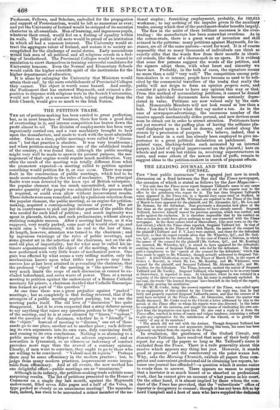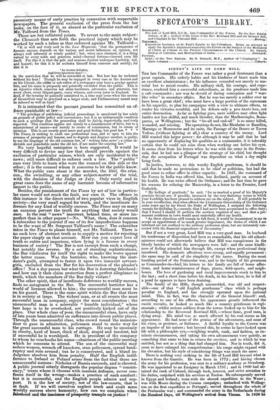THE LEADING JOURNAL AND THE LEADING COUNSEL. THE "best public
instructors" are engaged just now in much discussion on a feud between the Bar and the Times newspaper, the occasion of which is stated as follows by the Law Magazine-- " Not only does the Times never report Sergeant Talfourd's name in any MIMI in which he is engaged, but his name is struck out of the reports sent to the office by the gentlemen who report for it. The last time Sergeant Talfourd's name appeared in the Times was in a Special Jury cause tried at Stafford, in which Sergeant Talfourd and Mr. Whitmore are reported in the Times of the 21st- of March to have appeared for the plaintiff, and Mr. Alexander, Q.C., Mr. Lee, and Mr. Symons, for the defendant. Just previously a discussion took place at the Bar mess on the propriety of the resolution we have already named. Sergeant, Talfourd, however, himself moved the previous question, which was carried, and spoke against the exclusion. It is therefore impossible that by his conduct on that occasion he could have given umbrage to any one connected with the Times newspaper. In the three causes tried at Shrewsbury, (the next town on the Ox- ford circuit,) which the Times alone reported, Sergeant Talfourd led.' In that of Jobson v. Loxdale, in the Times of the 26th March, the names of the counsel for, the plaintiff (Talfourd and F. V. Lee) were omitted, and those for the defendant inserted; so that the report records alone that Mr. Whateley, Q.C., and Mr. God- son, Q.C., appeared for the defendant. In the case of France v. Dawson, in which the names of the counsel for the plaintiff (Mr. Godson, Q.C., and Mr. Keating) are inserted, Mr. Whateley, Q.C., is stated to have appeared for the defendant; omitting the name of Sergeant Talfourd, who led for the defendant. The Judge paid a compliment to the speech of the counsel for the defendant,' which was thus made to apply to Mr. Whateley, though actually addressed to Sergeant Tal-. fourd! A third falsification occurs in the Times of March 27th, in the report of Stokes v. Boycutt, in which Mr. Lee, Mr. Keating, and Mr. Whitmore, were counsel for the plaintiff, and Sergeant Talfourd, bfr. Alexander, Q.C., and Mr. Yardley, for the defendant. The Times, however omitted the names of Sergeant Talfourd and Mr. Yardley. Sergeant Talfourd, who happened to be in every cause at Shrewsbury, is reported in none. At Gloucester, where he was retained in a majority of the thirty-two causes in the list, his name is studiously excluded. In one case, the words the learned Sergeant' have been left in the body of the report; thus plainly proving the mutilation. " Mr. W. H. Cooke, being the avowed reporter of the Times, was called upon for an explanation of this conduct by the Circuit: his reply was, that he had fairly and properly reported Sergeant Talfonrd's name, and that the erasure of it must have occurred at the Times office. At Gloucester, where the matter was finally discussed, Mr. Cooke read to the Circuit a letter addressed by him to the person at the Times office to whom his reports were also directed: in this letter he complained of the omission, and sought the means of vindicating his own con- duct from the imputation cast upon him. He also read a reply to it from the Times office, couched in terms of coarse and vulgar insolence, containing a refusal to give any explanation for the satisfaction of the Circuit, or to gratify the vanity of any of its members ! " The attack did not end with the Assizes. Though Sergeant Talfonrd has appeared in several causes and arguments during this term, his name has been ngorously excluded from the reports in the Times. In retaliation, the gentlemen of the Oxford Circuit, uno dissent iente Talfourd, have resolved that none of their body shall report for any of the papers so long as Mr. Talfourd's name is excluded from the Times. There is a rude generality about this resolve which appears any thing but just. However, it stands good at present • and the controversy on the point waxes hot. Why, asks the Morning Chronicle, exclude all papers from com- petent and convenient professional aid in obtaining law reports, be- cause one journal has offended I—a question which it seems easier to evade than to answer. There appears no reason to suppose that a barrister is so much biased or so absorbed in professional work, that he cannot give an account of what passes in his court. On the other hand, it is almost implied by those whom the con- duct of the Times has provoked, that the by office of reporter is derogatory to counsel; though it has not been felt so by Lord Campbell audit host of men who have supplied the deficient. pecuniary means of early practice by connexion with respectable newspapers. The general exclusion of the press from the bar looks, 'on the face of it, as absurd as the particular exclusion of Mr Talfourd from the Times. -these are but collateral points. To revert to the main subject : the Chronicle thus sets forth the practical injury which may be worked by such a taboo as that enforced against Mr. Talfourd- '"It is well and truly said in the Law Magazine, 'that the permanence of forensic success depends on the various and secret influences on opinion, not always well informed or wisely guided'; but, when once obtained, it is a thing valued by every noble and generous mind—beyond fortune—beyond even life itself For this it is that the pale and anxious student undergoes hardship, toil, and hazard; for this it is he secludes himself from converse and society; for this it is
he scorns delights, And lives laborious days '—
in the conviction that he will be rewarded at last. But how has he reckoned without his host! Though"he may be engaged in every case at the Assizes and on his Circuit, the editor or sub-editor of a newspaper may have a grudge against him, and his name is purposely and pointedly excluded from the public. This is an injustice which concerns not alone barristers, advocates, and attornies, but every client, every litigant party, every witness, and every juror in England. In- deed, if the tyranny be patiently submitted to, a time may come when the system of favouritism may be practised on a larger scale, and Parliamentary names may be tabooed as well as legal."
It is intimated that the peccant journal has committed an of-
fence punishable at law-
- ". The inivilige of publishing judicial proceedings is sanctioned by law solely on grounds"of public policy and convenience; but it is an indispensable condition to such a privilege that the _proceeding shall be fairly, impartially, and truly st• ard. This condition applies not merely to a misstatement of facts, but to a nusetuent of names—not merely to errors of commission, but to errors of omission. This is not merely good sense and good feeling, but good law. • * • The Times, in seeking to exalt one professional man, and to open to him the avenues of prosperity and honour, and to degrade and disgrace another, is guilty, to use the language of the old common law, of writing false news '; a crime in- dictable and punishable under the old law, if not under the existing law." No very hopeful enterprise is here suggested. It would be be difficult to devise any law that should provide against the ex usion of particular names, which are only incidental to the news ; still more difficult to enforce such a law. The " public " care very little to learn who were the counsel on this side or the other; • it is the counsel whom it concerns to let the public know.
What public care about is the murder, the libel, the crim. con., the swindling, or any other subject-matter of the trial, with the decision of the Judge or Jury. Only rarely and in great cases does the name of any barrister become of substantive import to the public.
Besides, the punishment of the Times by act of law in particu- lar cases would not reach the fault, nor cure it. The offence in this instance is the direct result of two popular vices in English society—the very small regard for truth, and the inordinate de- ference for any kind of worldly success. The Times may on many an occasion pervert the truth for anything that society would eare. Is the real " news" incorrect, behind time, or more im- perfect than in other papers ?—No. What, then, does it concern a Subscriber to the journal if one of its few imperfections happens to be the want of Mr. Sergeant Talfourd's name ? The subscriber takes in the Times to please himself, not Mr. Talfourd. There is no such love of abstract truth as to supply a motive for rejecting- the paper simply on that account. How can you expect love of truth so entire and imperious, when lying is a licence in every business of society ? The Bar is not exempt from such a charge, hut notably the reverse. By a set of standing sophistications, the Bar vindicates for itself the right to make the worse appear the better cause. Was the barrister, who, knowing the mur- derer's guilt, attempted to fasten it upon two innocent servant- girls, excluded from the Bar for his desecration of the pleader's office ? Not a day passes but what the Bar is fostering falsehood : and how can it then claim protection from a perfect allegiance to truth, which the members of the Bar daily violate ? The other spirit, that of inordinate deference to worldly success, finds no antagonist in the Bar. The successful barrister has a world of licences allowed to him ; the unsuccessful man must be on his guard. There is the same spirit within the Bar that there is in society- at large. The richest man, or at all events the most successful man in company, enjoys the most consideration : the -unsuccessful man is a miserable " humble individual," whose best hope is to be overlooked, not positively kicked out of the place. Our whole class of poor, the unsuccessful class, have only of late years been admitted on sufferance into divers public places. 'Through the unsuccessful class, who crowd round the mansion- door to gaze in admiration, policemen stand to make way for the great successful man to his carriage. He may be unseemly in obesity, hard of heart,. thick of skull, stupid and insolent, but if successful he is worshiped. He is president of the company to whom he vouchsafes his name—chairman of the public meeting which he consents to attend. The son of the successful may seduce women, wrench off knockers, stun policemen, spread bank- ruptcy and ruin around; but he is consecrated, and a bland in- dulgence absolves him from penalty. Half the English indif- ference to Ireland or Poland arises from the fact that those are unsuccessful nations : Nicholas of Russia succeeds, and is cheered. A public journal utterly disregards the popular dogma " consist- ency," treats whom it chooses with insolent defiance, never con- fesses itself in the wrong—makes a practice of such conduct : but it is successful, and the English people admire and sup- port. It is the law of society, not of the law-courts, that is at fault. If we will ourselves neglect truth and exalt mere worldly success above humanity, how can we complain when falsehood and the insolence of prosperity trample on justice ?



























 Previous page
Previous page